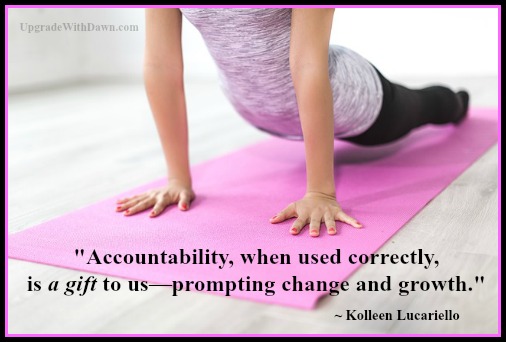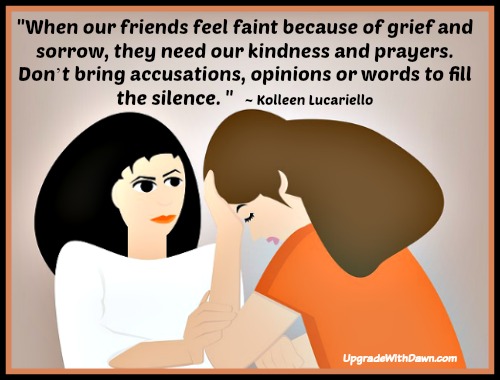Inaccurate Perceptions & Faulty Assumptions
It's always fun to see how Kolleen Lucariello's mind works. She takes interesting life experiences and makes them "speak" God's truth into our lives. In this Spiritual Growth UPGRADE, she shares a story about trees and what she overlooked concerning their care. 
"I’ve never had much of a ‘green-thumb'," Kolleen says. "I will admit that recently my eyes have been green with envy when I’ve witnessed what Merriam-Webster.com Dictionary defines as an “unusual ability to make plants grow.”
I (Dawn) have always joked that I have a "black thumb." I try, but I fail. Kolleen shares a possible reason for my failing, and makes a deeper application.
Kolleen continues . . .
Something tells me that if Merriam-Webster had a definition that read “an unusual ability to plant-it-and-forget-it,” I think you’d find my name.
Whatever I plant must be strong enough to survive with little care.
Do you remember the Ronco Rotisserie Grill‘s infomercial slogan? “Set it and forget it!” That is harmonious with the poor plants I acquire—I set them and forget them.
That’s what happened to two pine trees we planted over twenty years ago.
We planted them within a small fenced-in pool area and never showed them another moment of care; they were left to fend for themselves.
The pine trees were never trimmed, pruned, or fertilized.
Actually, we never realized they were supposed to be trimmed and pruned until years later when a friend mentioned it.
Many advised us to remove them. Advice we ignored.
The trees became the topic of conversation when our son brought his family to stay for the summer, and he suggested it was time to remove them. Suddenly, we had the opportunity to put years of talk into action.
Just like that—we didn’t know what to do.
- I was hesitant. After all, they had been there for over 20 years.
- I was nervous. How would removing them impact the appearance of that little area?
- I felt guilty. My mother insinuated I was a tree killer.
But, after weeks of polling anyone willing to offer an opinion, we took the risk and pulled them out.
What a surprise we found! Once sections of the fence had been removed, it was obvious that what we’d seen with our eyes was different than what was actually happening within the tree.
What we believed was a healthy tree was actually a tree that had split into sections with only a bit of green on the end of the branches. Leaving bare, scraggly, ugly branches clutching to the trunk.
As I stood and watched the trees come down that day, I was struck by how inaccurate my perception had been about the health of the trees. All these years, I had a faulty assumption based solely on the outer appearance.
It can be easy to forget that what I spy with my little eye isn’t always as it appears.
For example:
- We thought the trees were fine even though we never took time to inspect them.
In similar fashion, we like to give the perception that everything is “fine” even when it’s not.
How many times have you replied, “I’m fine,” when the truth was you were in such turmoil within that it took all of your strength to get out of bed that day?
Upon further inspection, it became apparent you were not fine.
- We failed to recognize the reliance the trees had come to place upon the fence.
Removing the fence around the trees caused us to realize the trees had become reliant upon the fence for added support.
We run the risk of becoming a bit unstable whenever we attach ourselves to the wrong support system.
- We never gave the trees the proper care and attention they needed.
If we had attended to the trees over the years by pruning and trimming them, they would have grown into healthy trees.
The life of a follower of Christ is one of trimming and pruning, too. It’s how we remain healthy.
Three important Upgrades
1. Become authentic in your struggles.
Jesus told us the truth sets people free (John 8:32), and we fulfill the law of Christ when we bear one another’s burdens (Galatians 6:2).
If you’re not fine, please tell someone you trust.
2. Choose your support system wisely.
God reminded the Israelites numerous times, “it was I who”... brought... delivered... rescued... destroyed. God was their support.
He expects to be ours too.
3. Understand your need for the proper care.
God is the Ultimate Gardener.
The Lord trims, prunes and shapes us as only He can.
If we’re going to become the person God intended, then we must allow the Gardner to do the necessary work. He prunes to produce the fruit He’s looking for—not the fruit of our preference or according to our liking, but His (John 15:1-9).
The trees are gone and we like the change. However, I regret that our lack of awareness led to our failure to maintain them properly. If we had, they might have survived.
I suppose this is a lesson for us, too. Caring for one another properly involves: inspection, recognition, and attention; and that leads to growth!
Who can you attend to today?
 Kolleen Lucariello, #TheABCGirl, is the author of the devotional book, The ABC's of Who God Says I
Kolleen Lucariello, #TheABCGirl, is the author of the devotional book, The ABC's of Who God Says I Am; and as a speaker, she speaks into women's lives "one letter at a time." Kolleen and her high school sweetheart, Pat, reside in Central New York. She's a mother of three married children and Mimi to six incredible grandkids. For more information about Kolleen, visit her website.
Am; and as a speaker, she speaks into women's lives "one letter at a time." Kolleen and her high school sweetheart, Pat, reside in Central New York. She's a mother of three married children and Mimi to six incredible grandkids. For more information about Kolleen, visit her website.
Graphic adapted, courtesy of Rondell Melling at Pixabay.
 Post a Comment → Posted on
Post a Comment → Posted on  Thursday, November 5, 2020 at 10:28AM
Thursday, November 5, 2020 at 10:28AM  Assumptions,
Assumptions,  God the Ultimate Gardener,
God the Ultimate Gardener,  God's Pruning,
God's Pruning,  Kolleen Lucariello,
Kolleen Lucariello,  Perceptions,
Perceptions,  Pruning Trees,
Pruning Trees,  Tending to Needs,
Tending to Needs,  Upgrade with Dawn Upgrade Your Life
Upgrade with Dawn Upgrade Your Life  Spiritual Growth
Spiritual Growth 














